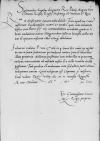List #2990
Sigismund II Augustus Jagiellon do Ioannes DANTISCUSVilnius, 1546-08-15
| odebrano Heilsberg (Lidzbark Warmiński), 1546-08-30 Rękopiśmienne podstawy źródłowe:
| ||||
Tekst + aparat krytyczny + komentarzZwykły tekstTekst + komentarzTekst + aparat krytyczny
Reverendissimo in Christo Patri domino
Reverendissime in Christo Pater sincere nobis dilecte.
Fuere apud nos civium nostrorum
Subvereri videtur Paternitas Vestra et alii eo quod fuerit hic cuius res agitur ne nos in suam sententiam pertraheret contra iura et libertates illius provinciae. Nollemus existimari tam ibecilles ut quacumque ratione interveniente ab instituto nostro et a recto tramite divelli possemus. Fuit quidem et audivimus eum, sed alteri parti alteram reliquimus aurem. Quod reliquum est.
Cupimus Paternitatem Vestram bene valere.
Dat(ae) or Dat(um)⌈Dat(ae)Dat(ae) or Dat(um)⌉
Ex Commissione sacrae


 BCz, p. 94 (48)
BCz, p. 94 (48)